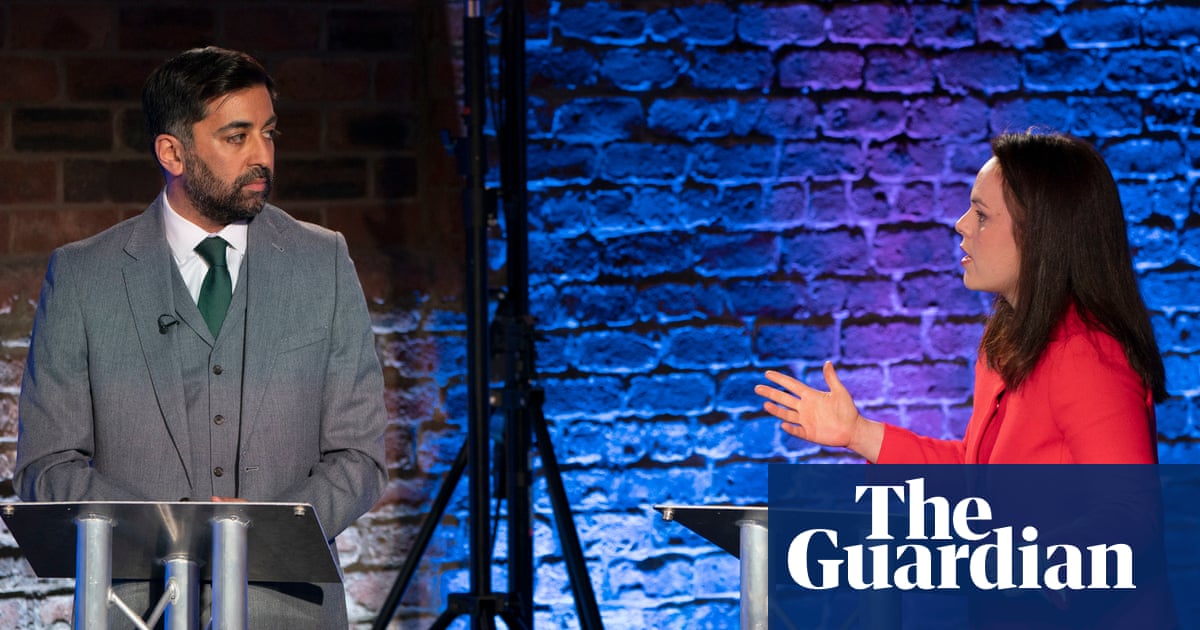
The Scottish National party is facing a near wipeout in Westminster after dominating politics in Scotland for a decade, as an exit poll suggested it would be left with just 10 MPs, down from 48.
Scotland’s former first minister Nicola Sturgeon told ITV that the projection showing it would lose 38 constituencies would translate into a “seismic” night for Labour, if it proved accurate.
She said: “This is not a good night for the SNP on those numbers … This is at the grimmer end of the expectations for the SNP if the exit poll is right.”
The former Scottish Conservative party leader Ruth Davidson described the exit poll results as a potential “massacre” for her party across the UK, but pointed out they suggested the Tories could double their number of seats in Scotland to 12.
The first result announced in Scotland is expected to be Rutherglen, which could declare at 1am.
Speaking on ITV, Sturgeon said she believed the results of the exit poll would turn out to be “broadly right”.
The SNP had been expecting a bad night, with the first minister, John Swinney, warning that votes in many constituencies were on a knife edge.
Privately, it been hoping for about 20 seats, but the projected 10 would be the worst result since 2010 – prior to the independence referendum.
It has been a turbulent two years for the SNP, during which time it has had three leaders. Sturgeon quit her post, saying she was burnt out, in February 2023, just weeks before her husband, Peter Murrell, was questioned in connection with alleged embezzlement of party funds. He was charged earlier this year. Sturgeon was also arrested, but released without charge.
Humza Yousaf, Sturgeon’s apprentice, stepped down in May after his power-sharing deal with the Scottish Greens in Holyrood fell apart – with Swinney then taking the reins.
Labour, on the other hand, is expecting a Lazarus-style recovery from 2019, its worst result in Scotland since 2010 when it had only one MP.
Polls before Thursday predicted Labour would take between 25 and 26 seats, wining seats in the central belt of Edinburgh, Glasgow and their surrounding constituencies.
“This is seismic for Labour. There’s no getting away from that, it’s a massive achievement for Keir Starmer,” said Sturgeon. “I think it will be interesting as the night progresses to see the extent this is driven by the Tory collapse as opposed to a Labour surge.”
The election comes after a decade-long attempt by Labour to recover support in Scotland after suffering horrific losses in 2015 and 2019. Buoyed by the independence referendum in 2015, the SNP left all the competition in the dust, taking 56 of the then 59 seats.
In 2017, Labour staged a slight recovery by winning seven seats, only to lose six of them in 2019.
With the SNP’s iron grip on Scottish politics apparently weakening, questions will be asked about the its political strategy centring on independence and the constitutional place of Scotland.
The party’s independence strategy has held up on the back of the Conservative party’s unpopularity in Scotland, which had voted to remain in the EU in 2016.
But with worsening NHS waiting lists, a cost of living crisis and a resurgent Labour party, voters may have decoupled their own desire for stability from the constitutional question of independence which was at the centre of the SNP’s manifesto in 2024.
Polls showed Labour breaking through in Scotland, like the rest of the UK, in the immediate aftermath of Liz Truss’s disastrous premiership, winning over Conservative voters.
It began to dent SNP’s dominance after the resignation of Sturgeon and by last year was neck and neck with the nationalists, overtaking them when Yousaf quit earlier this year.
Sturgeon said: “I think there will be a question about whether there was enough in the campaign to give out, effectively, a USP to the SNP in an election that was about getting the Tories out and replacing them with Labour.”











